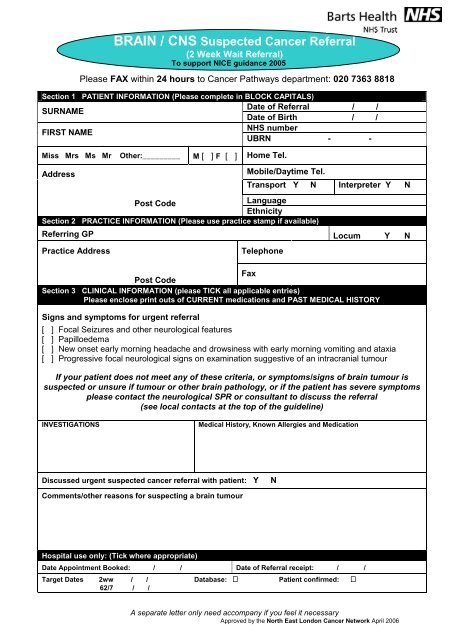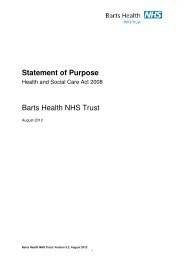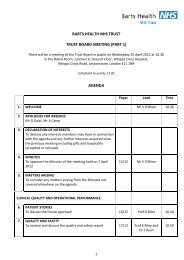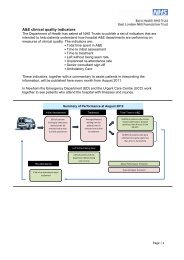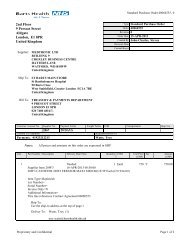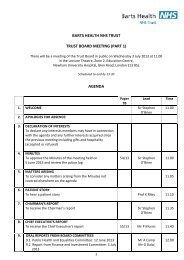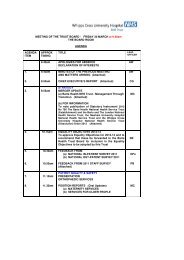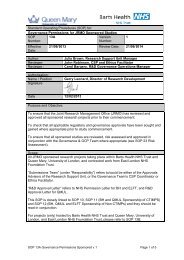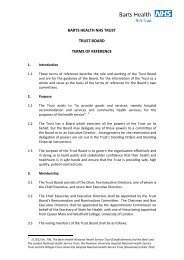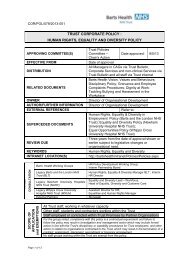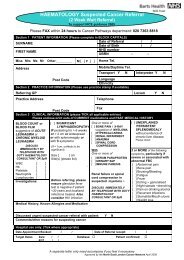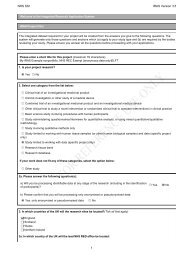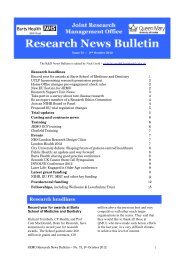Brain and CNS referral form - Barts Health NHS Trust
Brain and CNS referral form - Barts Health NHS Trust
Brain and CNS referral form - Barts Health NHS Trust
Create successful ePaper yourself
Turn your PDF publications into a flip-book with our unique Google optimized e-Paper software.
BRAIN / <strong>CNS</strong> Suspected Cancer Referral<br />
(2 Week Wait Referral)<br />
Please FAX within 24 hours to Cancer Pathways department: 020 7363 8818<br />
Section 1 PATIENT INFORMATION (Please complete in BLOCK CAPITALS)<br />
SURNAME<br />
Date of Referral / /<br />
Date of Birth / /<br />
FIRST NAME<br />
<strong>NHS</strong> number<br />
UBRN - -<br />
Miss Mrs Ms Mr Other:_________ M [ ] F [ ] Home Tel.<br />
Address<br />
To support NICE guidance 2005<br />
Mobile/Daytime Tel.<br />
Post Code<br />
Language<br />
Ethnicity<br />
Section 2 PRACTICE INFORMATION (Please use practice stamp if available)<br />
Transport Y N Interpreter Y N<br />
Referring GP Locum Y N<br />
Practice Address<br />
Telephone<br />
Fax<br />
Post Code<br />
Section 3 CLINICAL INFORMATION (please TICK all applicable entries)<br />
Please enclose print outs of CURRENT medications <strong>and</strong> PAST MEDICAL HISTORY<br />
Signs <strong>and</strong> symptoms for urgent <strong>referral</strong><br />
[ ] Focal Seizures <strong>and</strong> other neurological features<br />
[ ] Papilloedema<br />
[ ] New onset early morning headache <strong>and</strong> drowsiness with early morning vomiting <strong>and</strong> ataxia<br />
[ ] Progressive focal neurological signs on examination suggestive of an intracranial tumour<br />
If your patient does not meet any of these criteria, or symptoms/signs of brain tumour is<br />
suspected or unsure if tumour or other brain pathology, or if the patient has severe symptoms<br />
please contact the neurological SPR or consultant to discuss the <strong>referral</strong><br />
(see local contacts at the top of the guideline)<br />
INVESTIGATIONS<br />
Medical History, Known Allergies <strong>and</strong> Medication<br />
Discussed urgent suspected cancer <strong>referral</strong> with patient: Y<br />
N<br />
Comments/other reasons for suspecting a brain tumour<br />
Hospital use only: (Tick where appropriate)<br />
Date Appointment Booked: / / Date of Referral receipt: / /<br />
Target Dates 2ww / / Database: Patient confirmed: <br />
62/7 / /<br />
A separate letter only need accompany if you feel it necessary<br />
Approved by the North East London Cancer Network April 2006
LOCAL CONTACT DETAILS<br />
If you wish to discuss any clinical issues concerning this <strong>referral</strong> please contact:<br />
Dr Julian Fearnley Consultant Neurologist 020 7363 8002<br />
If you wish to discuss any other aspect of this <strong>referral</strong> please contact the Cancer Pathways Office<br />
on 020 7363 8817 / 9275 / 3399<br />
CRITERIA FOR URGENT SUSPECTED CANCER REFERRAL 1<br />
Please FAX the <strong>referral</strong> <strong>form</strong> within 24 hours<br />
Refer a patient who presents with symptoms suggestive of brain or <strong>CNS</strong> cancer to an appropriate<br />
specialist, depending on local arrangements.<br />
Discuss any concerns about a patient’s symptoms <strong>and</strong>/or signs with a local specialist. If<br />
rapid access to scanning is available, consider as an alternative to <strong>referral</strong>.<br />
Re-assessment <strong>and</strong> re-examination is required if the patient does not progress according to<br />
expectations.<br />
Urgently refer patients with:<br />
<br />
<br />
<br />
<br />
Symptoms related to the <strong>CNS</strong> in whom a brain tumour is suspected including:<br />
o Progressive neurological deficit (e.g. Hemiparesis)<br />
o New onset seizures<br />
o Headaches with vomiting <strong>and</strong> papillodema<br />
o Mental changes<br />
o Cranial nerve palsy / unilateral sensorineural deafness<br />
Early morning headaches of recent onset accompanied by features suggestive of<br />
raised intracranial pressure, e.g. vomiting, drowsiness, posture related headache<br />
(worse when lying down), or by other focal or nonfocal neurological symptoms (e.g.<br />
blackout, change in personality or memory)<br />
A new, qualitatively different, unexplained headache that becomes progressively<br />
severe <strong>and</strong> of up to two weeks duration<br />
Refer urgently patients previously diagnosed with any cancer who develop any of the<br />
following symptoms, e.g. recent-onset seizure, progressive neurological deficit,<br />
persistent headaches, new mental or cognitive changes or new neurological signs.<br />
Consider urgent <strong>referral</strong> to an appropriate specialist in patients with rapid progression of:<br />
o Subacute focal neurological deficit<br />
o Unexplained cognitive impairment, behavioural disturbance or slowness, or a<br />
combination of these<br />
o Personality changes confirmed by a witness <strong>and</strong> for which there is no reasonable<br />
explanation even in the absence of the other symptoms <strong>and</strong> signs of a brain tumour<br />
Please do not use the pro<strong>form</strong>a for non urgent <strong>referral</strong>s<br />
Refer the patient by means of a routine <strong>referral</strong> letter<br />
Investigations<br />
• In a patient with new, unexplained headaches or neurological symptoms, undertake a<br />
neurological examination guided by the symptoms, but including examination for<br />
papilloedema. Note that the absence of papilloedema does not exclude the possibility<br />
of a brain tumour.<br />
• When a patient presents with seizure, take a detailed history from the patient <strong>and</strong> an<br />
eyewitness to the event. Carry out a physical examination, including cardiac,<br />
neurological <strong>and</strong> mental state, <strong>and</strong> developmental assessment, where appropriate.<br />
1 Based on Referral Guidelines for Suspected Cancer (NICE, 2005)<br />
Notes in grey refer to the evidence grading used in the NICE guidelines, for more in<strong>form</strong>ation see<br />
www.nice.org.uk/cg027NICEguideline


